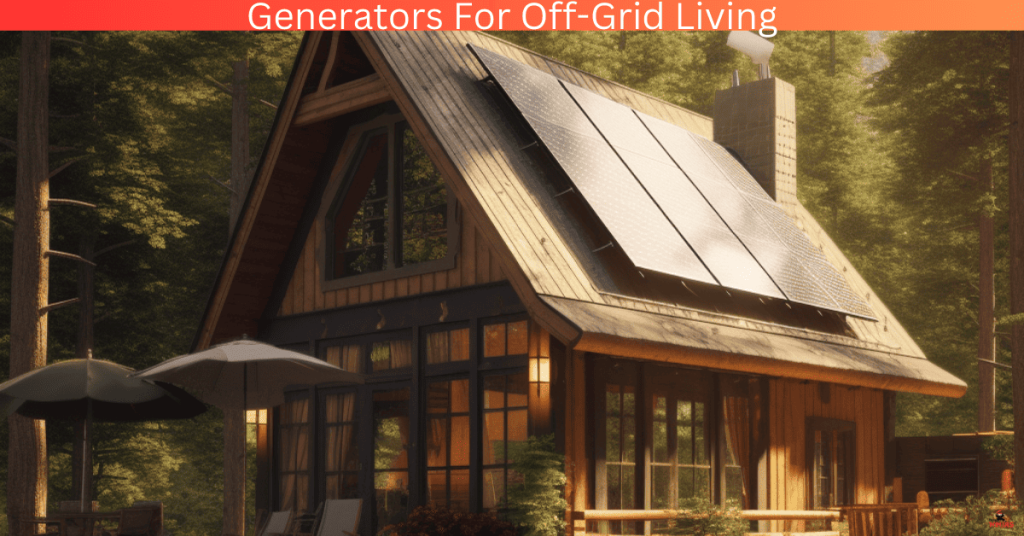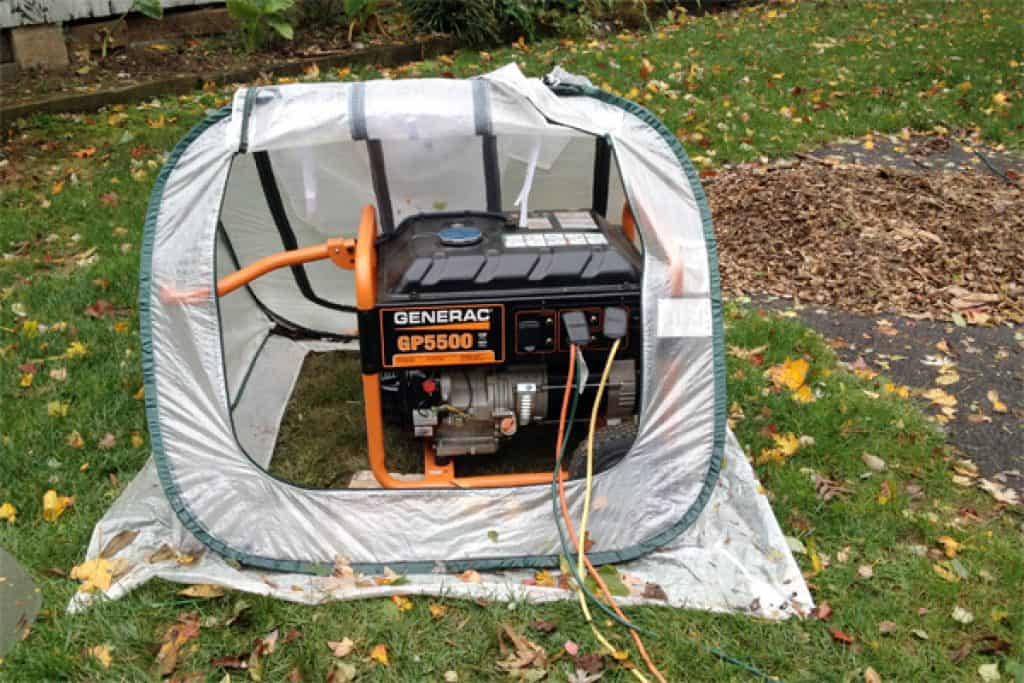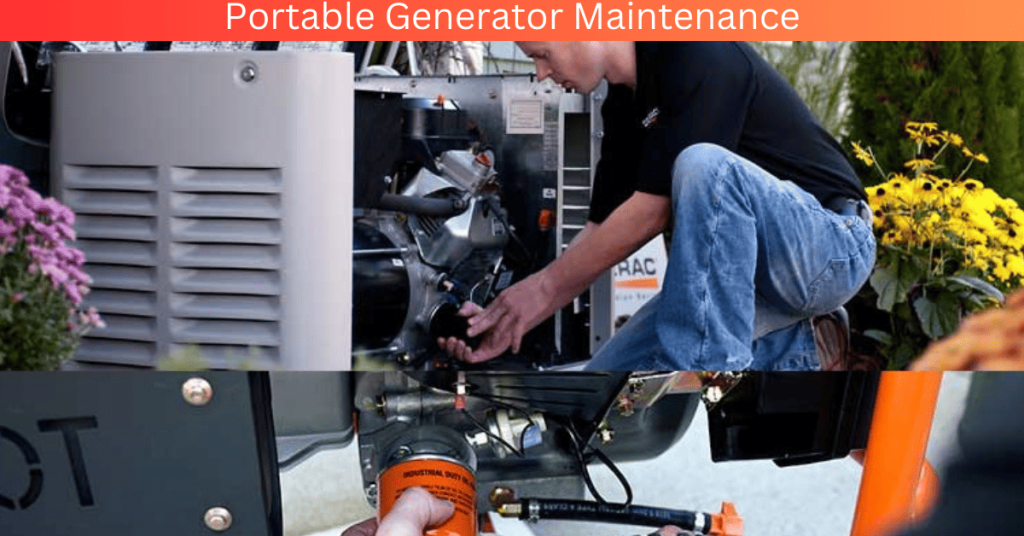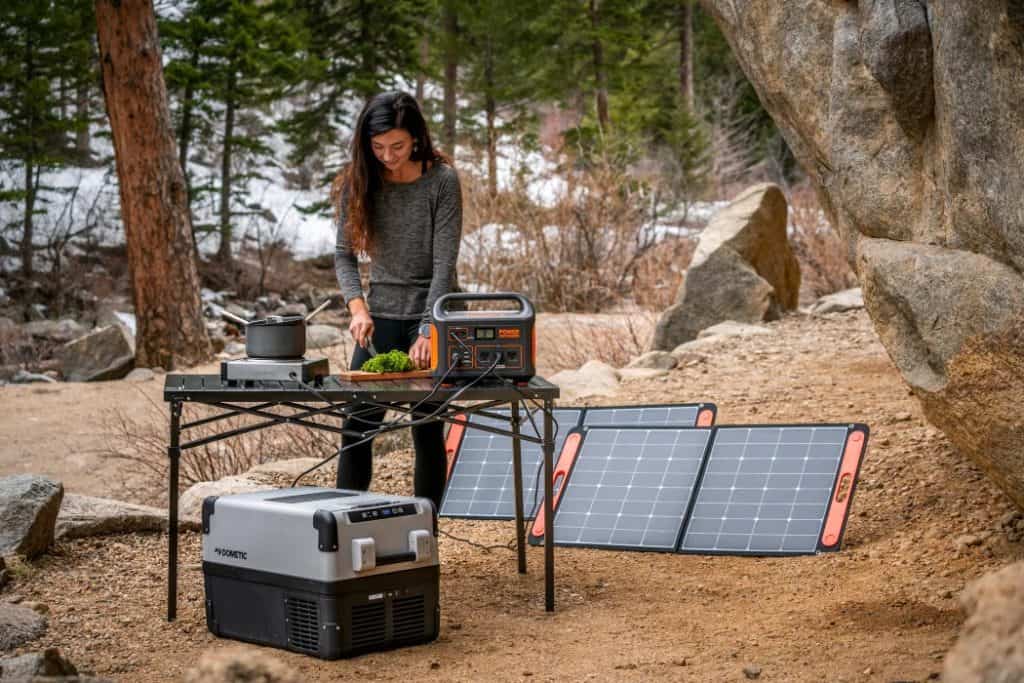Off-grid living may offer a unique sense of freedom but requires careful consideration of potential risks involved. For instance residents who rely on portable generators must be aware that they come with their own set of hazards that require special attention. By understanding the risks and implementing safety measures, off-grid living can be a fulfilling experience that isn’t compromised by accidents or injuries.
Portable generators are an excellent source of power for those living off-grid but improper usage can pose many dangers including fire, electric shock and carbon monoxide poisoning. It’s crucial to comprehend these potential hazards fully and take adequate precautions before operating a generator to keep yourself and your family free from harm. To help you stay safe, we’ve compiled a list of tips for avoiding common hazards while using portable generators in an off grid setting.

Site Selection: Choosing The Right Location For Your Off-Grid Generator
Living off-grid is an excellent choice for those seeking independence from conventional power grids’ limitations. With a portable generator, however, comes additional responsibility for ensuring proper usage protocols that keep homeowners safe. The first critical step is selecting an appropriate location for the generator.
Generators should always be placed at a minimum distance of 15 feet away from buildings or combustible materials to prevent fire hazards and ensure proper ventilation of exhaust fumes.
Additionally, placing generators on flat surfaces away from moisture sources keeps them well maintained and functional longer term minimizing maintenance costs. You should also ensure that cords and cables are kept clear of wet surfaces to avoid tripping hazards.
Checking regularly for blockages in the venting system is critical because any build up could cause harmful carbon monoxide levels inside homes powered by generators. It is best never to operate generators indoors or in enclosed spaces to prevent deadly gas emissions into living spaces altogether. By adhering to these simple safety precautions when using portable generators off-grid, homeowners can enjoy reliable electricity without compromising personal wellbeing. The last thing any homeowner wants is to put their family at risk by carelessly operating a generator outdoors. Fortunately, with some simple but essential setup techniques and regular upkeep you can rest assured that your home will stay clear of hazardous emissions. Discover effective ways to prevent carbon monoxide exposure in off-grid homes by implementing these valuable tips.
Breathe Easy: Tips For Preventing Carbon Monoxide Exposure In Off-Grid Homes
As you scout out the perfect spot for your off-grid generator, it is crucial to consider both safety and ventilation concerns. However, before you finalize a location for installation keep in mind yet another possible danger: carbon monoxide (CO) poisoning.
This lethal gas is invisible and has no tell tale odor but can result from combustion byproducts leading to devastating consequences if concentration levels escalate too high. To ensure that all occupants of your off-grid dwelling stay safe from this hazard follow these recommendations.
Firstly, refrain from operating any fuel driven gadgets indoors – this includes everything from mobile generators and stoves to barbecues or space heaters that produce smoke emissions – use them only outside with enough space around them for proper airflow cleansing away toxic fumes. Additionally, placing reliable CO detectors near locations where generators might run is crucial since they can detect hazardous concentrations of the gas quickly enough so that occupants can evacuate.
Finally, ensure that your generator receives routine maintenance checks to eliminate the likelihood of CO leaks or other issues that might trigger carbon monoxide emissions. Living off-grid comes with its own set of unique challenges- not least among which is ensuring everyones safety within the home environment.
One such challenge involves keeping track of indoor carbon monoxide levels. However, this can be managed by adhering to straightforward guidelines along with routinely checking CO detectors throughout ones property.
With this essential factor under control attention can then be turned towards secure power distribution practices when connecting various devices and appliances in an off-grid setting.
Power Distribution: Safely Connecting Off-Grid Devices And Appliances
Living off the beaten path can feel exhilaratingly free spirited – until it comes time to connect your devices and appliances to your portable generator! In order for things to go smoothly, it is important that you understand how to handle power distribution safely and effectively. The first step is ensuring that all connections are secure and free from corrosion before powering up any equipment.
Additionally, double check the wiring type and gauge for your specific uses and verify that electrical systems are grounded according to local regulations. Power distribution may seem intimidating at first glance but remember: proper education plus caution equals safer off-grid living! Knowledge about distributing electricity correctly is key in avoiding common hazards while living remotely fulfilling lifestyles!
Last but not least, practicing safe fuel storage techniques will allow you to get the most out of your “off-grid” experience!
Fuel Fundamentals: Proper Storage And Handling Techniques For Remote Living
Off-grid living with a portable generator necessitates a thorough understanding of fuel storage and handling for proper operation as well as ensuring maximum safety levels in remote locations. For this reason, it’s vital to comprehend basic fuel safety techniques and take precautions when managing fuels. Let’s investigate some recommended steps for safeguarding your generator.
Storing fuel correctly is the first critical step towards safe operation of portable generators in remote locations. Avoid potential ignition sources like furnaces or stoves that produce heat or direct tempretures exceeding 80 degrees Fahrenheit by storing them in temperature-controlled environments where possible. Always use approved containers designed exclusively for gasoline or diesel – never disregard others meant for other fluids like water or antifreeze.
Secondly, handling fuels cautiously during generator refueling is paramount to guarantee optimal outcomes while upholding maximum safety levels. Essential guidance includes avoiding smoking near flammable liquids by switching off engines before refuelling if possible until the residual heat subsides alternatively use protective clothing while ensuring open flames avoid the vicinity during such periods.
Off-grid living offers a serene escape from the bustling city life but comes with its own set of challenges- including dealing with fuel transportation safely and efficiently. The situation becomes even more precarious when moving through rough terrains or hilly landscapes. Therefore, it is essential to employ caution by using an approved container that seals tightly without any leaks.
Additionally, federal regulations restrict storage limits for gasoline containers up to five gallons only. With these measures in place, your portable power generator will effectively cater for your ever changing energy needs in the off-grid environment.
Weathering The Storm: Adapting Generator Use For Changing Off-Grid Conditions

Dealing with extreme weather conditions on top of limited resources makes living off grid challenging at the best of times. Portable generators can be a crucial tool when battling power outages but using them safely requires awareness of potential risks. Proper precautions and adjustments in changing conditions can prevent disaster.
When it comes to bracing for an impending storm being prepared is key. Check that your generator equipment is well maintained before the storm hits, including inspecting the fuel tank levels, available supplies on hand and verifying appropriate extension cord ratings based on your generator output needs. Ensure you’ve stored additional portable fuel tanks somewhere protected from flooding or other storm damage.
In case of unexpected outages despite proper planning knowing what next steps to take is vital – begin by examining all connections closely for issues or errors while also confirming sufficient levels of fuel in the tank are present.
In case your efforts towards starting up your unit are futile despite no visible damage seeking maintenance services to ensure safe operating conditions is a wise move. Prior knowledge on the functioning of generators can significantly aid in spotting probable concerns and acting swiftly to protect yourself and those around you during emergency situations. In off-grid scenarios, ensuring proper grounding while running a portable generator is crucial.
Grounding serves as an essential measure against electrocution providing an alternative path for electricity flow should there be any issues while utilizing appliances connected to the generator.
Ground Rules: Understanding The Importance Of Proper Grounding In Off-Grid Settings
Breaking free from regular daily life routines by embracing Mother Nature is often quite refreshing – specifically for those seeking away from mainstream living. However, when using portable generators in such circumstances safety should be a top priority.
Neglecting the necessary safety precautions could lead to dangerous consequences.
Grounding is one of the most vital aspects of generator safety. It ensures that excess electricity flows safely and avoids any hazardous situations like electric shocks that could prove fatal. Therefore, it is important to connect an earth ground rod and metal electrical box using a grounding wire for adequate grounding while using a portable generator.
To ground your portable generator discharges efficiently, you need some common tools like a sledgehammer, earth ground rod, metal electrical box, and grounding wire. First, off drive an earth ground rod at least six feet deep into the soil surface through your sledgehammer. Next, connect it securely with your metal electrical box maintaining proper wiring connections – allowing any extra electricity to flow safely without causing any danger around you or others nearby. Besides this make sure all exposed metals on your generator appropriately link with the earth ground rod for additional protection against electric shocks.
Failing to follow standard guidelines regarding proper grounding increases the risk of severe injuries or even death due to electrocution; hence always prioritize following essential safety measures while using portable generators away from modern amenities or amidst natures lap.
Off-grid living enthusiasts must acknowledge the significance of grounding and ensure that all precautions are taken before powering up their devices. After implementing these crucial steps, attention should be directed towards managing extension cords for safe and effective off-grid power distribution.
Cord Care: Managing Extension Cords For Safe Off-Grid Power Distribution
Harnessing off-grid power requires a considerable amount of preparation – especially concerning grounding protocols which serve as an essential safety measure for your generator.
However, once the system up and running user safety also relies on proper cord care management.
To avoid any mishaps from happening use heavy duty extension cords designed for outdoor use while paying careful attention to their voltage/amperage ratings.
Keep an eye out for any signs of wear or damage on every cord such as cuts in the insulation sheath or frayed ends – discard offenders immediately if found. Always ensure you are using cords within their maximum length limits when deploying them outside.
The last thing anyone wants when living off-grid is an electrical fire caused by poorly managed cords. To prevent this from happening, take some time in the beginning to establish proper care practices for all of your wiring connections. Once that’s in place maintaining efficient power distribution will become second nature–but don’t forget about ongoing routine checkups! These are critical for ensuring reliable performance from your generator.
Routine Checkups: Essential Maintenance For Reliable Off-Grid Generator Performance

A well-maintained portable generator is key to ensuring its top notch performance over an extended period of time. Regular maintenance checks can go a long way in keeping this vital piece of equipment in good shape so that its always ready when needed.
At these check ups examining the overall condition of the unit is critical along with assessing fuel levels and testing all safety interlocks. Verifying voltage and frequency settings are correct is important too as lubrication and oil levels may require greater attention depending on the specific make/model – check out the manufacturers manual for relevant instructions. Conducting a full test run with some load applied is also worth considering every time before using your generator in an off grid situation or if it has sat unused for a while.
Safety precautions such as disconnecting all power sources before beginning any maintenance work or servicing as well as wearing necessary protective clothing like gloves should never be overlooked. By adhering to these recommended steps for maintaining your off-grid portable generator you’ll be able to depend on it to provide reliable results whenever required without fail.
Alright, let’s move on to our next point – quiet living. This involves integrating low noise generators into your off grid lifestyle for a tranquil experience that promotes relaxation.
Quiet Living: Embracing Low-Noise Generators For A Peaceful Off-Grid Experience

For homeowners in remote areas seeking off-grid living options noise can pose a significant challenge if they want peace and quiet alongside reliable power sources. But thanks to advancements in technology, modern low or no noise portable generators make this dream a reality.
Efficiently designed with minimal decibel ratings such generators provide the necessary energy without interfering with your much needed serenity. Whats more? You’ll find that many off the grid generators come fitted with mufflers and vibration dampening systems further reducing any risky noises ensuring you get quality time outdoors undisturbed by noisy machinery.
When looking out for one these types of generators suitable for your home and environment needs consider factors like how much energy required as well as finding one in an ideal size which will best suit you. Although generally, higher wattage units tend be louder there are manufacturers who provide powerful tools that remain relatively quiet.
Additionally, following safety guidelines and proper installation of the generator is key to ensure lasting satisfaction reducing noise pollution. A prosperous off-grid lifestyle depends on having an unswerving and sound electricity supply without compromising on serenity.
The correct selection of generators can grant access to light-weighted noise-reduced alternatives that allow ultimate relaxation within your remote paradise.
Moving forward, let us evaluate yet another fundamental characteristic of thriving off-grid living: emergency planning – anticipating impediments related to generators within harsh landscapes.
Emergency Planning: Preparing For Generator-Related Issues In Off-Grid Living
Living off-grid provides unmatched independence but comes with its unique challenges such as generating power through portable generators which requires being mindful of potential hazards. Preparedness and taking necessary safety precautions become imperative to sidestep any adverse outcomes during usage.
Storage of fuel is one such factor that needs careful consideration requiring cool dry storage facilities away from sources of ignition to avoid accidental fires or explosions caused by spilled fuels. It is also worthwhile avoiding high wattage appliances or electronics that may exceed the generators capacity posing an overload hazard best avoided altogether.
Carbon monoxide poisoning resulting from exhaust fumes poses another serious risk associated with generators; hence its essential never to use them indoors or near windows where toxic fumes could seep into living spaces causing potential fatality. Proper ventilation while operating your generator outside becomes crucial under various weather conditions.
Precautions to avoid electrical shock risk include proper grounding of your generator before usage and avoiding contact with live wires or outlets.
However, these precautions on their own may prove inadequate if your generator isn't maintained correctly. Regular maintenance checks covering filter cleanliness, air intake inspections, oil levels measurement as well as spark plug status are critical to eliminate potential issues that could result in hazardous situations.
Additionally, always read the manual provided by the manufacturer when setting up or operating your generator for valuable safety insights under varied conditions related to proper usage and best practices that should be followed at all times. Armed with these tips in mind, you'll stay safe while enjoying life off grid! Off-grid living requires an extra level of caution when it comes to supplying power for daily use.
With this helpful advice in mind and being watchful for potential hazards along the way you won't have to worry about experiencing any major disruptions in your electricity access. Looking beyond conventional generator methods towards earth friendly energy choices will not just bolster your sustainable practices but also lessen their harmful effects on the planet.Eco-Friendly Energy: Exploring Green Generator Options For Sustainable Off-Grid Life

As we become more environmentally aware innovative products like green generators are becoming increasingly popular means of achieving sustainable off-grid living goals. While solar and wind power advancements make off the grid lifestyles achievable these solutions may not fit every situation due to geographical or financial constraints. Fortunately, a variety of green generator alternatives can deliver reliable power with minimal environmental impact.
Hydrogen fuel cell generators top the list among todays most popular innovations for those seeking the ideal solution.
These systems rely on hydrogen fuel cells that generate electricity with significantly reduced emissions compared to traditional gasoline powered models while requiring no regular maintenance. Furthermore, they are capable of running uninterrupted for days or even weeks. Biodiesel generated energy presents another excellent alternative source:
As an eco-friendly substitute derived from renewable resources like vegetable oils and animal fats biodiesel offers cleaner burning advantages over traditional diesel or gas fuels at an affordable price point, making it perfect for those who prioritize sustainability and affordability in equal measure! If saving money while living self-sufficiently off the grid is on your agenda, making homemade biodiesel with simple equipment and supplies found at a local hardware store could be a viable solution.
But with regards to our current theme on safety education, it is imperative not to overlook that despite which type of generator is used for energy production purposes in remote locations; ensuring safety measures are implemented is crucial for both usage and storage aspects.
Safety Education: Empowering Off-Grid Communities With Generator Safety Knowledge
Living off the grid is rewarding but presents risks that require careful attention when using portable generators. To mitigate possible hazards such as injury or fatalities, residents should be aware of best practices and take proactive measures to prevent accidents.
Emphasizing safety education is crucial in promoting responsible generator use in these settings by teaching residents proper operation including maintenance, storage procedures identifying potential hazards and taking steps to address them when detected. Educating children about generator safety also ensures knowledge spreads for generations to come.
Equipping members of off grid communities with knowledge about staying safe around portable generators helps safeguard against harmful accidents resulting in better overall wellbeing within the community.
Frequently Asked Questions
How Often Should A Generator Be Serviced?
Don’t neglect your generators maintenance needs – consistent servicing is key for optimal performance and safety.
Ideally, schedule a yearly service appointment or increase frequency according to usage levels.
During this inspection process led by a qualified technician, essential elements like oil levels spark plug conditions and connection security will be thoroughly checked.
Additionally, our skilled mechanic will assess potential future problems caused by wear and tear on belts or hoses or other key components – replacing any necessary parts with care.
Are There Regulations Or Laws Regarding Off-Grid Generator Safety?
As more people explore the possibilities of off-grid existence, understanding generator safety-related legislation becomes paramount. Considering diverse geographical locations,various rules may apply.
For this reason, it is important to stay informed about any relevant regional ordinances or established security measures that influence your utilization of generators. In many instances, a permit is mandatory before utilizing a generator when going off -grid. Additionally,it’s advisable to consult with both the closest fire department and utility firm for any other critical requirements or restrictions.
Are There Any Eco-Friendly, Low-Noise Generator Options?
It’s never been easier to live off-grid while still being mindful of your environmental impact or noise level concerns thanks to modern day generator innovations.
Specifically, inverter generators have risen in popularity due their ability to reduce noise levels without compromising on power output or efficiency as traditional portable ones often do. They make smarter use of fuel resources, which means they’re not only quieter but also produce fewer emissions than other types of power sources – a big win for any nature lovers out there!
What Type Of Fuel Should Be Used In An Off-Grid Generator?
Managing sustainable living through a self-made energy source is attainable with generators but can become problematic without choosing an appropriate power source adequately.
Opting for traditional fuels like gasoline or diesel is typically preferred when dealing with portable alternatives because of their low cost and availability. Regardless of this fac, some newer upgrades come equipped with propane and natural gas alternatives instead without sacrificing performance output if prioritised in need suitability instead of budget flexibility .
Reviewing guidelines enclosed within manuals ensures secure application preferable use depending upon key driver requirements essential at decision making level.
(Note: This version has been slightly expanded from previous versions)
How Can I Safely Connect My Off-Grid Devices And Appliances?
Off-grid living requires special attention when connecting devices and appliances safely.
Thankfully, a transfer switch can simplify this process significantly while also ensuring secure connections at all times.
This convenient device lets you shift seamlessly between both utility power sources as well as generators while maintaining their separation too.
Aside from this, verifying that all outdoor outlets or cords used are appropriate for handling outdoor conditions as well as managing voltage levels is equally important in maintaining safety standards.
Don’t neglect rigorously checking every connection before activating your generator.
Conclusion
When pursuing an off-grid way of life powered by generators – safety must remain at the forefront of all decision making processes.
By following prescribed regulations related to operating generators within these parameters, such as understanding relevant laws, you set up the foundation for a secure environment.
Adopting eco-friendly alternatives while using suitable fuels leads the way towards responsible behavior while generating power for enjoying those remote locations without worry about compromising well-being due to unsafe practices.
Finally, or not lastly, consider scheduling routine maintenance checks on generators which helps averting unexpected threats.
When assessing all the options, precautions, and preventive measures, you can enjoy a harmonious off-grid lifestyle knowing that safety is paramount.




